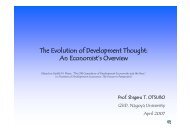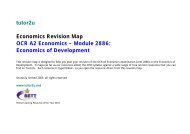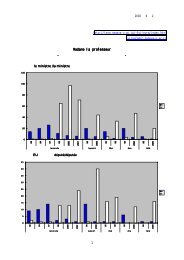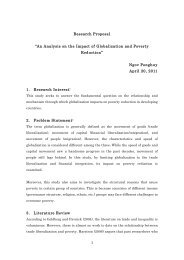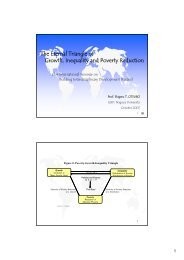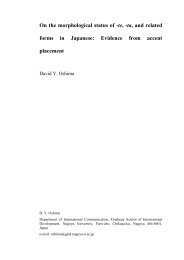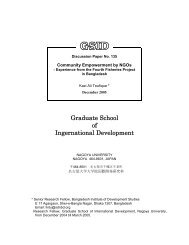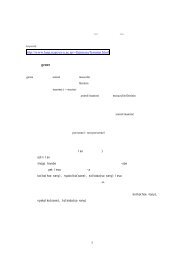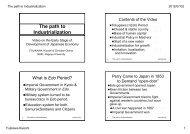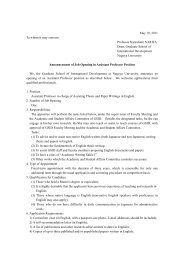Report
Report
Report
You also want an ePaper? Increase the reach of your titles
YUMPU automatically turns print PDFs into web optimized ePapers that Google loves.
168 QUANTIFICATION OF BENEFITS FROM ECONOMIC COOPERATION IN SOUTH ASIA<br />
South Africa; Singapore; Sri Lanka; Suriname;<br />
Switzerland; Thailand; Trinidad and Tobago; Tunisia;<br />
Turkey; United Arab Emirates; United States; Uruguay.<br />
Several initial offers have been derestricted by the<br />
member concerned and are publicly available on the<br />
WTO website. 7 In addition, some members have made<br />
their initial offers, or summaries thereof, publicly<br />
available on their internet sites. Since 19 May 2005,<br />
the following members have submitted 30 revised<br />
offers: Australia; Bahrain; Brazil; Canada; Chile; the<br />
People’s Republic of China; Taipei,China; Colombia;<br />
Egypt; European Communities and its member states;<br />
Honduras; Hong Kong, China; Iceland; India; Japan;<br />
Korea; Liechtenstein; Macao, China; Malaysia; Mexico;<br />
New Zealand; Norway; Peru; Singapore; Suriname;<br />
Switzerland; Thailand; Turkey; United States; Uruguay.<br />
Several revised offers have been derestricted by the<br />
Member concerned and are publicly available on the<br />
WTO website.<br />
LIBERALISATION IN TELECOMMUNICATION<br />
SERVICES UNDER THE URUGUAY ROUND<br />
This Section is based on a combination of recent<br />
information and the WTO Document of December,<br />
1998. The overall picture is the same with each of these<br />
two information sources.<br />
Classification of Telecommunications Service<br />
Sectors and the Commitments made by Various<br />
SAFTA Members<br />
Section 1 described the classification of telecom services<br />
into seventeen categories (mentioned in the first column<br />
of Table 15.1 above); fourteen of which are ordered<br />
from ‘a’ to ‘n’, and three ‘other’ categories under ‘o’.<br />
Though these services are classified separately in the<br />
list, the ongoing convergence arising due to<br />
technological and market development is blurring the<br />
distinction among some of these categories. Given<br />
convergence, provision of packaged or bundled services<br />
by the same operator will increasingly become a norm<br />
in the future. Members therefore have adapted the<br />
WTO classification in their commitment and offer<br />
schedules, due not only to convergence but also on<br />
account of their own requirement. For example, in its<br />
schedule, Bangladesh distinguishes between telecom<br />
services for public and private use and has introduced<br />
a category called Gateway Earth Station services.<br />
Nonetheless, given the nature of information available,<br />
7<br />
www.wto.org<br />
this section will provide the relevant details based on<br />
the seventeen sectoral classifications.<br />
As of January 2000, 93 WTO members had included<br />
telecommunications services in their Schedules of<br />
Commitments. Basic telecommunications is included<br />
in the schedule of commitments of 83 WTO members<br />
and value-added services have been committed on by<br />
72 member governments. In addition, 72 members have<br />
committed on some or all aspects of the reference paper.<br />
Of these, 66 have accepted the reference paper in its<br />
entirety or with minor modifications. All industrialised<br />
countries have taken commitments on basic telecommunications,<br />
most value-added sectors, and the<br />
reference paper. Industrialised countries operate an<br />
extremely liberal telecom regime and have largely<br />
bound the applicable regime in their schedules. On the<br />
other hand SAFTA countries (excluding Bhutan, who<br />
is not a member), have made limited commitments in<br />
telecom. Only Sri Lanka has fully committed to the<br />
principles enshrined in the reference paper, while<br />
Maldives has made no commitments at all. Even the<br />
commitments made by SAFTA countries in telecom are<br />
meaningless when compared to the prevalent regime<br />
in the respective countries. This is further discussed<br />
later.<br />
The Nature of Commitments made in the Schedules<br />
Including the Types of Limitations on National<br />
Treatment and Market Access by SAFTA members<br />
As stated, SAFTA countries have made partial commitments.<br />
Further, such partial commitments were made<br />
much more for the mode of supply ‘commercial<br />
presence’, than for other modes of supply. Another<br />
noteworthy feature is that the ‘incumbent government<br />
monopoly’ has been accorded preferential treatment,<br />
viz., an automatic license or mandated use of facilities<br />
owned by it. For ‘national treatment’, most limitations<br />
relate to ‘nationality requirement’, followed by<br />
limitations relating to residency requirement, authorisations<br />
requirements, and ownership of property land.<br />
The number of limitations for ‘market access’ are much<br />
more than those for national treatment. These relate<br />
mainly to limitations on number of suppliers, types of<br />
legal entities, and participation of foreign capital.<br />
With regard to accounting rates, there was general<br />
appreciation among WTO members that the accounting<br />
rate regime in place would not be able to withstand<br />
the pressures brought about by competitive markets.<br />
It was, therefore decided to secure a shared understand-




